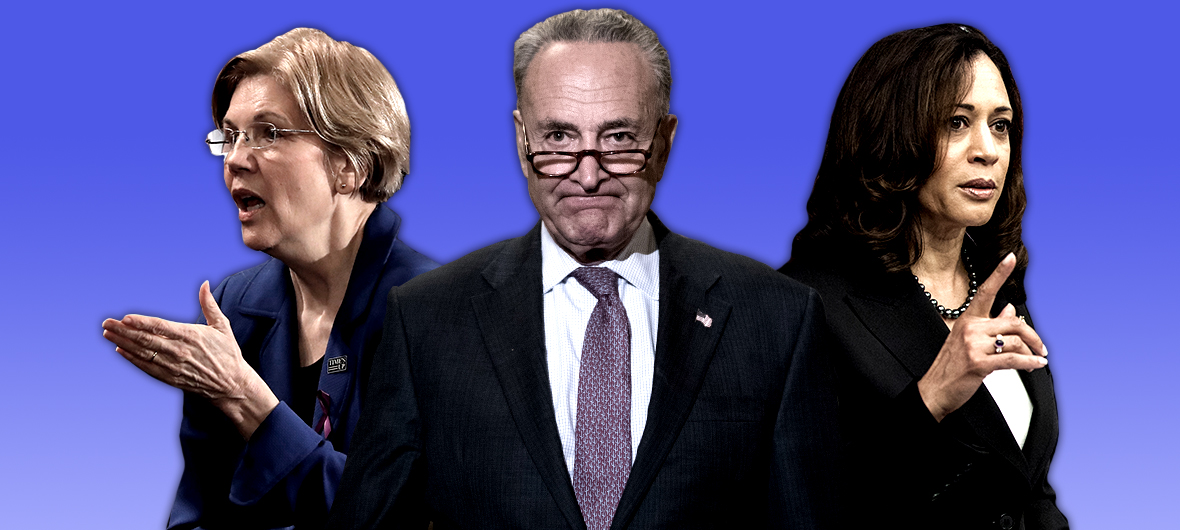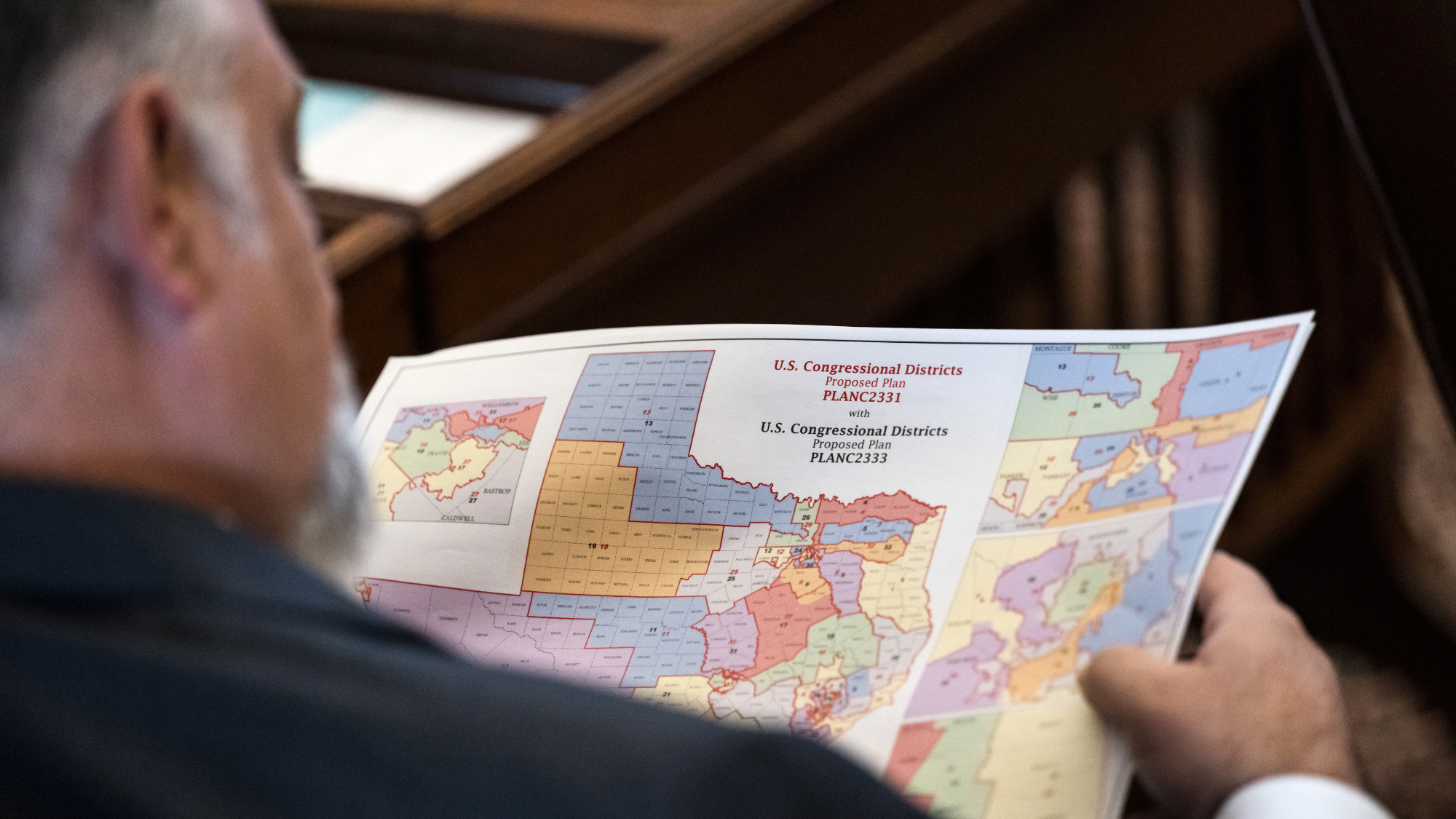The fight for the soul of the Democratic Party
The Democrats live in a house divided. There's only so long that this can stand.


Many political observers have been transfixed for months by the spectacle of the GOP falling to pieces over health care, immigration, free trade, and foreign policy, with warring factions of the party seemingly unable to agree on anything other than slashing taxes and prostrating before President Trump. But let's not let this blind us to the equally important schism of Democrats, some of whom are clamoring for single-payer health care while others seem intent on bowing before Wall Street's favored gutting of financial regulations.
It's not just the GOP. America's populist moment is marked by challenges to the political establishment and status quo on both sides of the ideological spectrum.
It makes sense that this would be the case, since populism isn't an ideology so much as an attitude of hostility to the powers-that-be. It holds that everyone in a position of power is corrupt — that both parties are in the grip of people and ideas that, intentionally or not, end up benefiting a relative few while leaving everyone else to pick up the scraps.
The Week
Escape your echo chamber. Get the facts behind the news, plus analysis from multiple perspectives.

Sign up for The Week's Free Newsletters
From our morning news briefing to a weekly Good News Newsletter, get the best of The Week delivered directly to your inbox.
From our morning news briefing to a weekly Good News Newsletter, get the best of The Week delivered directly to your inbox.
Since Donald Trump became the GOP presidential nominee back in 2016, the media has understandably devoted lots of attention to the story of this angry rebellion on the right. But an analogous insurrection is underway on the left, pitting two varieties of populism against the neoliberal centrists who have run the show since Bill Clinton won the nomination of the party in 1992.
The sharp disagreements among these Democratic factions have been papered over to some extent by a hostility to President Trump that keeps them united. This has contributed to the string of special election victories for the party over the past year. (Another potential pickup weighted with symbolism is on the line today in Pennsylvania's 18th congressional district, which Trump won by roughly 20 points and the Republicans are spending millions to try and hang onto.) But underneath the anybody-but-Trump solidarity lurks a simmering debate about where the Democratic Party should turn going forward. It broke out in the open during the 2016 primaries between Hillary Clinton and Bernie Sanders, and it's bound to do so again as we head into the midterm elections later this year.
So who are these Democratic factions? A brief guide:
Faction #1: The centrist establishment
A free daily email with the biggest news stories of the day – and the best features from TheWeek.com
Last week, 12 Democrats (and one independent) in the Senate joined with 13 Republicans in co-sponsoring a bill to weaken the Dodd-Frank banking regulations passed in the wake of the 2008 financial crisis. That was a quintessentially centrist and neoliberal move, demonstrating that a significant faction of the party continues to place its faith in markets and deregulation. This same faction has also been loudest in denouncing President Trump's proposed tariffs on steel and aluminum.
Led, for now, by New York Sen. Chuck Schumer, the neoliberal faction hopes to bring the party to victory by combining anti-Trump furor with a defense of standard Democratic positions on social issues and a series of small-ball proposals to offer voters a tepid “better deal” on the economy. (The model here is Bill Clinton's laundry-list style of delivering the State of the Union.)
As evidence that this will work, this faction points to Hillary Clinton's extremely narrow loss in 2016. Despite losing the Electoral College by a significant margin, she won the national popular vote and could have prevailed overall if just 80,000 or so votes in three states had gone the other way. Post-Trump, voters realize that they can't stay home on Election Day. The center-left is where the American electorate is, the neoliberal faction insists, if only people will show up at the polls.
Faction #2: The economic populists
This faction is led by Bernie Sanders, but it also includes Democratic Sens. Elizabeth Warren of Massachusetts and Sherrod Brown of Ohio, the latter of whom has made headlines in recent days by coming out in favor of Trump's steel and aluminum tariffs. The economic populists hope to win back the white working-class voters across the Rust Belt who ditched the Democrats (or just stayed home) in droves during the Trump-Clinton presidential matchup.
In some races this leads them to embrace more protectionist or socialist policies, while in others it inspires the more cautious and conservative approach favored by Conor Lamb, the frontrunner in Tuesday's special House election in Pennsylvania. Lamb is hoping to prevail by mobilizing union members, defending gun rights, and talking about the opioid crisis and the need to protect entitlements. Unlike some Democrats (see Faction #3 below), the economic populists don't act as if they believe that Trump's victory can be largely explained as an expression of racism. They think he spoke to and tapped into real and justified resentments about what the neoliberal era over the past several decades has done to their lives and communities.
Faction #3: The multicultural populists
Concentrated in deep-blue California and Democratic strongholds in cities, wealthy suburbs, and college towns, this third Democratic faction views a range of issues — rights for women, blacks, immigrants, Muslims, the disabled, homosexuals, and transgender people; the environment; gun control — through a culture-war lens. It hopes to win the battle over these issues with heavy doses of identity politics, mobilizing various demographic factions to fight for the soul of the country, proving to themselves and the world that the deplorably racist, sexist, and ignorant Trump voters who are most vocal on the other side of these issues represent a final, dying gasp of atavistic prejudice on the part of the formerly hegemonic white American majority.
What kind of economic policy should follow from this form of populism isn't always clear, since the faction emphasizes cultural conflict and seeks to amp up animosity on issues wrapped up with it (which are rarely straightforwardly economic). That makes it possible for different politicians and candidates to combine a multicultural stance with elements taken from one or the other of the factions. California Sen. Kamala Harris and New York Sen. Kirsten Gillibrand, for example, talk like multicultural populists, but they combine it with an economically populist message. New York Gov. Andrew Cuomo, by contrast, first came to office as a neoliberal who made no secret of his ties to Wall Street, but more recently he's been embracing ideas (like a $15 minimum wage and paid family leave) that seem designed to place him among the economic populists — all the while staking out firmly multicultural positions as well.
Just as immigration and trade sharply divide the GOP, so a range of economic and cultural questions divide the Democrats. It's just a matter of time before the battle for the soul of the party breaks out into the open, where it will need to be decided by the voters.
Damon Linker is a senior correspondent at TheWeek.com. He is also a former contributing editor at The New Republic and the author of The Theocons and The Religious Test.
-
 Supreme Court revives Texas GOP gerrymander
Supreme Court revives Texas GOP gerrymanderSpeed Read Texas Republicans can use the congressional map they approved in August at President Donald Trump’s behest
-
 Boat strike footage rattles some lawmakers
Boat strike footage rattles some lawmakersSpeed Read ‘Disturbing’ footage of the Sept. 2 attack on an alleged drug-trafficking boat also shows the second strike that killed two survivors who were clinging to the wreckage
-
 Elizabeth Gilbert chooses books about women overcoming difficulty
Elizabeth Gilbert chooses books about women overcoming difficultyThe Week Recommends The bestselling author shares works by Tove Jansson, Lauren Groff and Rayya Elias
-
 Has Zohran Mamdani shown the Democrats how to win again?
Has Zohran Mamdani shown the Democrats how to win again?Today’s Big Question New York City mayoral election touted as victory for left-wing populists but moderate centrist wins elsewhere present more complex path for Democratic Party
-
 Millions turn out for anti-Trump ‘No Kings’ rallies
Millions turn out for anti-Trump ‘No Kings’ ralliesSpeed Read An estimated 7 million people participated, 2 million more than at the first ‘No Kings’ protest in June
-
 Ghislaine Maxwell: angling for a Trump pardon
Ghislaine Maxwell: angling for a Trump pardonTalking Point Convicted sex trafficker's testimony could shed new light on president's links to Jeffrey Epstein
-
 The last words and final moments of 40 presidents
The last words and final moments of 40 presidentsThe Explainer Some are eloquent quotes worthy of the holders of the highest office in the nation, and others... aren't
-
 The JFK files: the truth at last?
The JFK files: the truth at last?In The Spotlight More than 64,000 previously classified documents relating the 1963 assassination of John F. Kennedy have been released by the Trump administration
-
 'Seriously, not literally': how should the world take Donald Trump?
'Seriously, not literally': how should the world take Donald Trump?Today's big question White House rhetoric and reality look likely to become increasingly blurred
-
 Will Trump's 'madman' strategy pay off?
Will Trump's 'madman' strategy pay off?Today's Big Question Incoming US president likes to seem unpredictable but, this time round, world leaders could be wise to his playbook
-
 Democrats vs. Republicans: who are US billionaires backing?
Democrats vs. Republicans: who are US billionaires backing?The Explainer Younger tech titans join 'boys' club throwing money and support' behind President Trump, while older plutocrats quietly rebuke new administration
